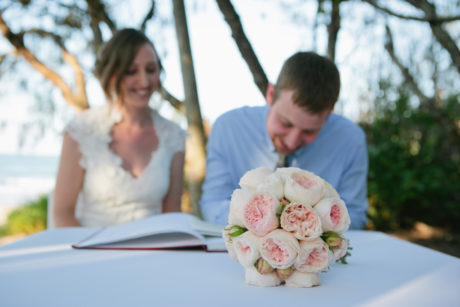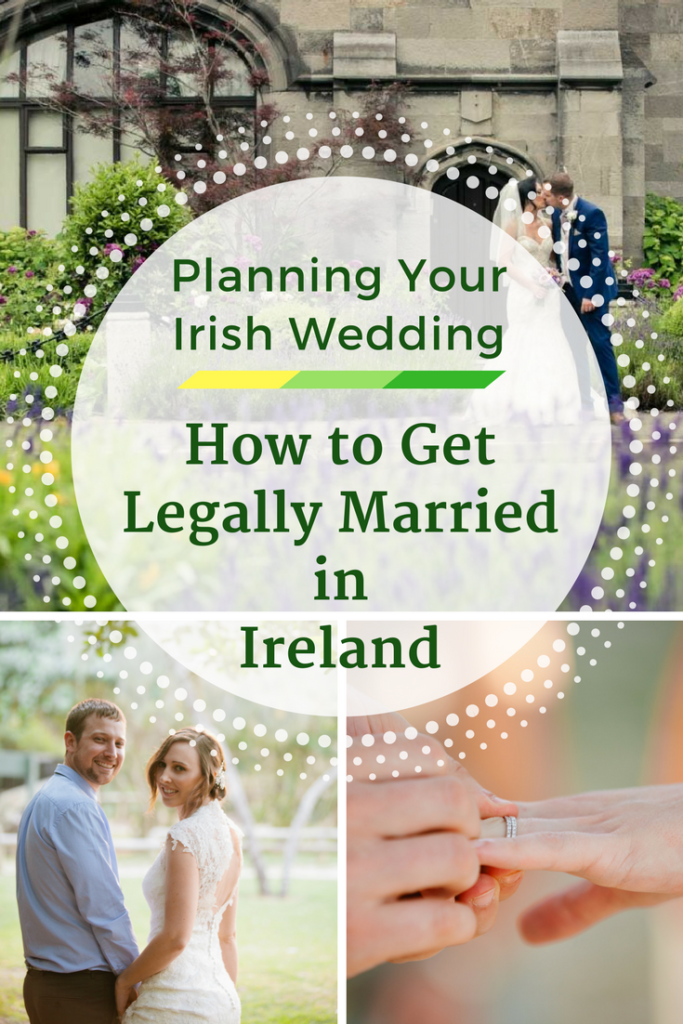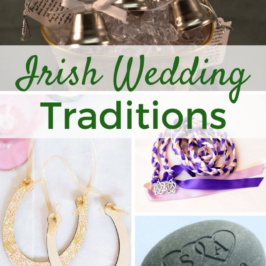This post may contain affiliate links. If you make a purchase through a link, I may receive a small commission, at no cost to you. These commissions help keep this website up and running, and I thank you for your support. Read my full disclosure here.
- Notification Requirements
- Civil Weddings in Ireland
- Religious and Secular Weddings in Ireland
- Renewing Your Wedding Vows in Ireland
Planning Your Irish Wedding
Ireland is a popular choice for a destination wedding, with its charming culture and people and fairy tale castles and estates. The magnificent scenic surrounds provide the perfect backdrop for your wedding photos.
Up until recent years, weddings in Ireland were only religious (predominantly Catholic) or civil. However, these days your wedding can also be spiritual or humanist (i.e. secular and non-religious ceremonies), as long as the person solemnising the marriage is on the Register of Solemnisers.
Same sex couples can also enjoy a legal wedding in Ireland following the commencement of the Marriage Act 2015. The requirement for a couple to be of opposite sex in order to marry has been removed, which means that Ireland is now also a popular wedding destination for same sex couples.
Please note: The minimum age for getting married in Ireland is 18 years.
Notification Requirements – Applies to All Legal Weddings in Ireland
Anyone planning on getting married in Ireland, whether you are an Irish citizen or a Foreign National, must give 3 months’ formal notification before marrying*.
Prior to getting married you need to lodge a marriage notification. To do this you need to make an appointment with the Registrar. You can find a Registrar in your area on their website. Once you have chosen your area, you can book your Registrar appointment online. To ensure you meet the 3 month notification requirement, make sure you schedule this appointment well in advance. Prior to your appointment with the Registrar, go through their detailed marriage appointment checklist on their website which details the documents you will need to bring to your appointment.
When you meet the Registrar, you will be required to sign a declaration that you know of no lawful impediment to your proposed marriage. The Registrar will issue an acknowledgement to both of you and the proposed solemniser of your marriage confirming the date of receipt of notification.
(*NB: This 3 month notification does not apply to those civil partners who already had a registered civil partnership in Ireland. However, you must schedule an appointment with the Registrar at least 5 days before the intended date of the ceremony to sign a declaration in their presence that there is no impediment to the marriage.)
Postal Notification
If either of you are living abroad or you are unable to attend an appointment with the Registrar, you need to contact a Registrar to get permission to make your 3 month notification by post. If permission is granted, the Registrar will send you a form which you must complete and return. However, you will still have to schedule to meet the Registrar at least 5 days before you get married in order to make the declaration. This is also required before a Marriage Registration Form (MRF) can be issued.
What You Will Need to Provide the Registrar
As well as providing original or certified copies of your documents, you also need to bring photocopies of them to give to the Registrar. In the case of a passport, a good quality, colour photocopy or a passport-sized photo is required.
If a document is not written in English or Irish, a certified English translation from an independent, verifiable, translation company must be provided.
Generally, you and your intended spouse will each be required to provide the following:
- Passport
- Birth Certificate
- If divorced, original final divorce decrees.
- If you have a civil partnership dissolution, the original dissolution decrees in respect of all previous civil partnerships.
- if you were in a civil partnership or marriage that was annulled by an Irish court, the final decree of nullity and a letter from the relevant court confirming that no appeal was lodged.
- If either of you is widowed, you will need to provide the deceased spouse’s death certificate and previous civil marriage certificate.
- If you are not a citizen of Ireland or an EU member state, you will need to provide documentary evidence of immigration status
- A Letter of Freedom to Marry or other documentary confirmation of civil status from county of origin if not a citizen of Ireland.
- You will also need to pay a notification fee.
You will also need to provide information about your intended marriage:
- Whether it will be a civil, secular or religious ceremony
- The intended date and location of the marriage
- Details of the proposed solemniser of the marriage
- The names and dates of birth of the 2 proposed witnesses
- For those living in Ireland, you will also need to provide your PPS number
- You should also provide a completed copy of the Data Capture Form (pdf)
What is a Marriage Registration Form (MRF)?
A Marriage Registration Form (MRF) is like a marriage licence. It gives you authorisation to marry in Ireland. Providing there is no impediment to the marriage, the Registrar will issue you with an MRF.
Please note: If the marriage does not take place within 6 months of the date of marriage given on the MRF, you will be required to repeat the MRF notification process.
For further information, please refer to the Irish General Register Office website.
Civil Weddings in Ireland
You should approach the Registrar of Civil Marriages for the district in which you intend to marry for information on how to proceed. Civil ceremonies are performed by civil registrars at prescribed times from Monday to Friday only, and never at weekends. Each county office has its own rules, so check with your chosen office on the details.
You still need to follow the Notification Requirements as stated above, however, this does not need to be with the same Registrar.
Civil Wedding Venue in Ireland
A civil ceremony can only be held in a Registry Office or some other venue that is approved by a Registrar, i.e. a place that is open to the public. If you want to get married in a venue other than the Registry Office you should contact the Registry Office for the district the venue is located to arrange to have it approved. This may involve the Registrar inspecting the venue. The guidelines for marriage venues are available on the General Registrar’s website.
Please note: There will be an additional fee for a civil ceremony held in a venue other than a Registry Office.
Civil Wedding Ceremony in Ireland
The marriage ceremony is solemnised by the Registrar who is on the Register of Solemnisers. The ceremony must be performed in the presence of two witnesses aged 18 or over. During the ceremony, you and your intended spouse must make two declarations:
- That you do not know of any impediment to the marriage
- That you accept each other as husband and wife
Marriage Registration Form (MRF)
Prior the ceremony, you should give the MRF to the Registrar who will be solemnising the marriage. Immediately after the wedding ceremony, the MRF should be signed by you and your spouse, the two witnesses and the Registrar. The Registrar will register the marriage as soon as possible after the marriage.
Further information: Find a Registrar in the area you are planning on getting married in.

Religious and Secular Weddings in Ireland
Up until recent years, weddings in Ireland were only religious (predominantly Catholic) or civil. However, these days they can also be spiritual or humanist (secular and non-religious ceremonies), as long as the person solemnising the marriage is on the Register of Solemnisers (which is maintained by the General Registrar) and you follow the correct legislation requirements for getting married in Ireland. These weddings can also be held any day of the week (depending of course on the availability of your chosen religious or secular body).
If you intend to on having a religious or secular marriage ceremony, you should approach the authorities of the body concerned for advice on how to proceed. You will be told what requirements that body has to get married under their rites. But you will still need to follow the Notification Requirements as stated above.
Please note: Due to the increasing popularity and demand for secular weddings, you need to book your solemniser well in advance.
Religious and Secular Wedding Venue in Ireland
According to the legislation, the place where the solemnisation takes place must be open to the public. This means that access to the venue for the general public must be unrestricted. The authorities of the body you have chosen will provide you advice on how to proceed.
Religious and Secular Wedding Ceremony in Ireland
A religious wedding ceremony will be carried out in line with the rites of the religion. However, a secular wedding ceremony is very flexible and led by the wishes of the couple. It can include poetry, readings, vows, music and traditions according to your own preferences. Each celebrant will have templates that you can review and adapt and will assist in the development of your celebration.
Regardless of the type of marriage ceremony, there are certain requirements that must be met in order for the marriage to be legal:
- The ceremony must be performed in the presence of two witnesses aged 18 or over.
- The person solemnising the marriage must be on the Register of Solemnisers which is maintained by the General Registrar.
While the marriage ceremony can be performed according to the customs and rites of the religious or secular body, as part of the ceremony you and your intended spouse must make two declarations:
- That you do not know of any impediment to the marriage.
- That you accept each other as husband and wife.
Marriage Registration Form (MRF)
Prior the ceremony, you should give the MRF to the person who is solemnising the marriage. Immediately after the wedding ceremony, the MRF should be signed by you and your spouse, the two witnesses and the person who has solemnised the marriage. The MRF should be returned within one month to a Registrar for the marriage to be registered. It does not have to be returned to the Registrar who issued it.
Further Information:
- Spiritualist Weddings
- Humanist Weddings
- For Religious weddings, contact your local church to get referred to a counterpart in Ireland.
Renewing Your Wedding Vows in Ireland
Under the laws of Ireland, if you are already married, you cannot get married again, even if it is to the same person. This means that you can’t renew your wedding vows in a civil ceremony in Ireland. However, there is a long tradition of “church blessings” in Ireland. This is where Irish people who have married in civil ceremonies abroad, marry in a religious ceremony the next time they are home. Sometimes, people living in Ireland have their marriage blessed in a religious ceremony, to commemorate a special anniversary or event. To find out more, contact your local clergyman who should be able to put you in touch with a counterpart in Ireland.
For those looking for a secular ceremony, Celebrants, Spiritualists and Humanist’s can provide a symbolic ceremony. Because your ceremony won’t be a legal wedding, that means that the location does not have to meet the restrictions that are in place for legal ceremonies.
Please note: The information in this article relates to getting married in the Republic of Ireland. For information on the requirements in Northern Ireland please refer to the nidirect Government Services website.
Further Information:
- Celebrant ceremony
- Spiritualist Ceremony
- Humanist Ceremony
- For a Religious ceremony, contact your local church to get referred to a counterpart in Ireland.









Leave a Reply